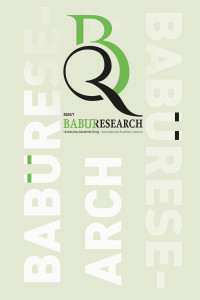Abstract
Bir milleti meydana getiren maddi ve manevi değerlerin tümüne kültür denir. Milletleri payidar kılacak unsurların başında kendi kültürünü yaşama, koruma ve gelecek nesillere aktarma gelir. Kültür dediğimiz maddi ve manevi değerlerin gelecek nesillere aktarımını mümkün kılan birçok vasıtanın olduğu tartışılmaz bir gerçektir. Kanaatimize göre bu vasıtalardan biri de milletlerin yetiştirmiş olduğu zirve şahsiyetlerdir.
Hiç şüphesiz, tarih boyunca büyük düşünür ve devlet adamları yetiştiren milletler varlıklarını devam ettirmiş, bunu başaramayanlar ise tarih sahnesinden silinmişlerdir. Meseleye bu yönüyle bakıldığında Türk milleti olarak abide şahsiyetler yetiştirme bakımından tarihimizin oldukça zengin olduğunu söyleyebiliriz. Bilge Kağan’dan Yusuf Has Hacip’e, Yunus Emre’¬den Mevlana’ya, Ahmet Yesevi’den Mahtum Kulu’ya kadar adını burada sayamadığımız nice büyük düşünürler Türk Milletinin ilim ve irfan bağında yetişmiş ve kültürel kodlarımızın günümüze kadarki taşıyıcıları olmuşlardır.
Bu çalışmada, Yusuf Has Hacip’in Kutadgu Bilig ile Ahmet Yesevi’nin ise Divân-ı Hikmet adlı eserlerinde geçen adalet/doğruluk, akıl ve bilgi/ilim kavramlarını, anlam yönünden karşılaştırıp Anadolu coğrafyası üzerindeki yansımaları üzerinde durmaya durulmuştur.
References
- Akgün, M. (1996), Türklük Dünyası’nın XI. Asırdaki Abide Eseri Kutadgu Bilig’de Akıl ve Bilgi, Felsefe Dünyası Sayı 19, s. 81-98.
- Cangızbay, K. (1998), Sosyolojik Praksis, Ötüken Yayınları, Ankara.
- Coşan, E. (1996), Makalat (Sadeleştiren: Hüseyin Özbay), Kültür Bakanlığı Yayınları, Ankara.
- Eraslan, K. (1991), Divan-ı Hikmet’ten Seçmeler, Ankara.
- Köprülü, F. (1991), Türk Edebiyatından İlk Mutasavvıflar, Ankara.
- Onat, H. (2010), Ahmed Yesevî’nin Din Anlayışı ve Bektaşilikteki Bazı Yansımaları, Ankara.
- Yusuf Has Hacib, Kutadgu Bilig, (çev. Reşid Rahmeti Arat), Türk Tarih Kurumu Yayınları, Ankara 1994, s. 69-70.
- Zal, Ü. (2009), Kutadgu Bilig ve Makalat’taki Bazı Ortak Temel Kavramlar Üzerine, Doğumunun 800. Yılında Hacı Bektaş-ı Veli Sempozyumu (Nevşehir 17-18 Ağustos), Nevşehir.
Abstract
Culture refers to all the material and spiritual values that constitute a nation. Among the elements that will empower nations, living, preserving, and transmitting their own culture to future generations come foremost. It is an indisputable fact that there are many means that enable the transmission of these material and spiritual values to future generations. In our opinion, one of these means is the exceptional personalities that nations produce.
Undoubtedly, nations that have produced great thinkers and statesmen throughout history have sustained their existence, while those who failed to do so have disappeared from the stage of history. Looking at the matter from this perspective, we can say that as the Turkish nation, our history is quite rich in terms of producing monumental figures. From Bilge Kağan to Yusuf Has Hacip, from Yunus Emre to Mevlana, from Ahmet Yesevi to Mahtum Kulu, many great thinkers, whose names we cannot mention here, have been raised within the Turkish nation in terms of knowledge and wisdom and have been the carriers of our cultural codes up to the present day.
In this study, the concepts of justice/truth, reason, and knowledge/science mentioned in Yusuf Has Hacip's Kutadgu Bilig and Ahmet Yesevi's Divan-ı Hikmet are compared in terms of meaning, and emphasis is placed on their reflections on the Anatolian geography.
References
- Akgün, M. (1996), Türklük Dünyası’nın XI. Asırdaki Abide Eseri Kutadgu Bilig’de Akıl ve Bilgi, Felsefe Dünyası Sayı 19, s. 81-98.
- Cangızbay, K. (1998), Sosyolojik Praksis, Ötüken Yayınları, Ankara.
- Coşan, E. (1996), Makalat (Sadeleştiren: Hüseyin Özbay), Kültür Bakanlığı Yayınları, Ankara.
- Eraslan, K. (1991), Divan-ı Hikmet’ten Seçmeler, Ankara.
- Köprülü, F. (1991), Türk Edebiyatından İlk Mutasavvıflar, Ankara.
- Onat, H. (2010), Ahmed Yesevî’nin Din Anlayışı ve Bektaşilikteki Bazı Yansımaları, Ankara.
- Yusuf Has Hacib, Kutadgu Bilig, (çev. Reşid Rahmeti Arat), Türk Tarih Kurumu Yayınları, Ankara 1994, s. 69-70.
- Zal, Ü. (2009), Kutadgu Bilig ve Makalat’taki Bazı Ortak Temel Kavramlar Üzerine, Doğumunun 800. Yılında Hacı Bektaş-ı Veli Sempozyumu (Nevşehir 17-18 Ağustos), Nevşehir.
Details
| Primary Language | Turkish |
|---|---|
| Subjects | Sociolinguistics |
| Journal Section | Research Articles |
| Authors | |
| Publication Date | June 7, 2024 |
| Submission Date | April 7, 2024 |
| Acceptance Date | April 20, 2024 |
| Published in Issue | Year 2024 Volume: 3 Issue: 1 |
Deniz Demiryakan


